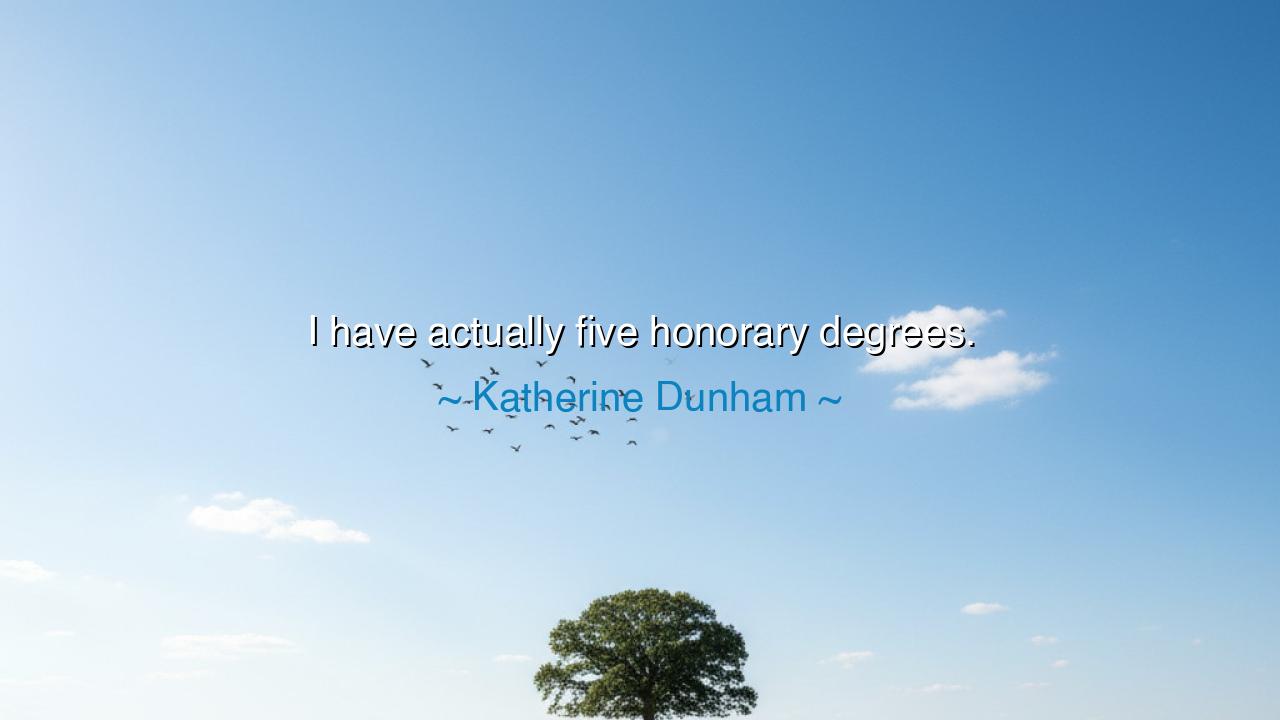
I have actually five honorary degrees.






The words “I have actually five honorary degrees” spoken by Katherine Dunham may appear simple on the surface, yet beneath their modest phrasing lies a profound declaration of a life’s worth — not measured in wealth or fame, but in recognition of unrelenting devotion to art, intellect, and cultural truth. Dunham, known as one of the most pioneering choreographers and anthropologists of the twentieth century, did not speak these words as a boast, but as a quiet testament to the honor that follows perseverance, to the rewards that arrive not by seeking them, but by living one’s purpose fully. Each honorary degree bestowed upon her symbolized the world’s acknowledgment of a woman who bridged the disciplines of dance and anthropology, body and spirit, movement and meaning.
In ancient fashion, let us remember that true honor never seeks itself. Dunham’s five honorary degrees were given not for titles she pursued, but for truths she revealed through her art — that dance is not mere entertainment, but an archive of civilizations, a vessel of collective memory. When she brought Caribbean and African rhythms to the Western stage, she was not only choreographing steps but translating the language of ancestry into motion, teaching societies to see the sacred in movement. Her recognition by the academy, therefore, was not a gift to her; it was an atonement from the world that once dismissed the cultures she honored.
It is said that when honor meets humility, greatness becomes immortal. Dunham’s statement, lightly spoken, carries a humility that magnifies its depth. She does not say, “I earned” but “I have.” She does not count her degrees as trophies but acknowledges them as symbols of passage — milestones on a path marked by both artistry and resistance. For Dunham lived in an era when a Black woman claiming intellectual authority was an act of courage. Yet she forged her way through discrimination and misunderstanding, creating a method — the Dunham Technique — that would forever transform modern dance, uniting the spiritual and the scientific.
Consider the life of Katherine Dunham in Haiti, where she immersed herself in the sacred dances of Vodou not as a tourist but as a student of truth. There she learned that movement is prayer, that rhythm is remembrance. When she later presented these rituals on stage, she did so not to exoticize, but to restore dignity to the traditions of her ancestors. For this merging of ethnography and performance, universities that once excluded her kind came to bow in respect, granting her their highest symbolic honors. Thus her five honorary degrees became five witnesses — each testifying to her unyielding spirit.
In this, we may also recall the story of Nelson Mandela, who, after long years of imprisonment, received more than a hundred honorary degrees from around the world. Like Dunham, he did not seek accolades, but his very endurance demanded that the world recognize its own conscience through him. True honor, in both lives, was not a crown worn by ambition, but a mirror held up to humanity, showing what it values when it awakens to justice and art.
The lesson, dear reader, is timeless: Honor is the echo of integrity. It arrives not when we chase approval, but when we labor for truth, beauty, or justice with unwavering heart. Those who build bridges between worlds — between body and mind, past and present, spirit and reason — often do not live for medals. Yet life, in its mysterious fairness, grants them such symbols to remind future generations of what is possible when purpose outshines fear.
Let us therefore walk as Katherine Dunham did — with rhythm in our steps and reverence in our work. Let our actions be so rooted in sincerity that recognition, if it comes, is but a natural consequence. Do not seek to be honored; seek to be honorable. And when, in the quiet of your years, the world offers you its degrees, its awards, or its applause — receive them not as rewards, but as affirmations that you have danced in harmony with the truth.






AAdministratorAdministrator
Welcome, honored guests. Please leave a comment, we will respond soon